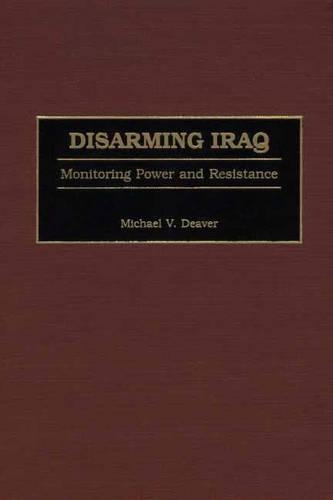
Disarming Iraq: Monitoring Power and Resistance
(Hardback)
Publishing Details
Disarming Iraq: Monitoring Power and Resistance
By (Author) Michael V. Deaver
Bloomsbury Publishing PLC
Praeger Publishers Inc
30th August 2001
United States
Classifications
Tertiary Education
Non Fiction
Arms negotiation and control
International law
Weapons and equipment
341.73309567
Physical Properties
Hardback
168
Description
Examines the power relationship between the United Nations and Iraq in the context of Iraqi resistance to imposed disarmanent from 1991 to 1998 by using sociological insights and a behavioral approach. The implementation of disarmament requirements imposed by the Security Council after Second Gulf War established a strong and unequal power relationship between the United Nations and Iraq. Although the ensuing struggle over imposed disarmament has been a major issue in world politics international relations theorists continue to ignore it. Deaver argues that this case has important theoretical implications. Using sociological insights and a behavioral approach, he examines the power relationship as well as Iraqi resistance from 1991 to 1998. Theorists are likely to find these analytic tools useful since they provide a ready means of studying the micro-foundations of power relations in generalized terms. Behavior such as supervision, surveillance, inspection, and monitoring are widespread and growing in world politics. A focus on tactics demonstrates the role of monitoring in maintaining and strengthening the relationship between the United Nations and Iraq. An analysis of dynamics makes comprehensible Iraqi losses of sovereignty and the eventual collapse of the relationship. Contrary to popular opinion, whoever escalated tensions hurt their own cause: Iraqi resistance contributed greatly to United Nations gains, while the United Nations successes led to the collapse of its relationship with Iraq.
Reviews
This study offers a rare insight into the diplomatic and military postures each side has taken over the last decade....a fascinating story in itself....Recommended for upper-division undergraduates and above.-Choice
"This study offers a rare insight into the diplomatic and military postures each side has taken over the last decade....a fascinating story in itself....Recommended for upper-division undergraduates and above."-Choice
Author Bio
Michael V. Deaver is Visiting Lecturer and Academic Coordinator of the Civic Education Project in Russia. He has traveled extensively in the Middle East and has taught courses on international relations and comparative politics in Russia as a Civic Education Project fellow for three years.
